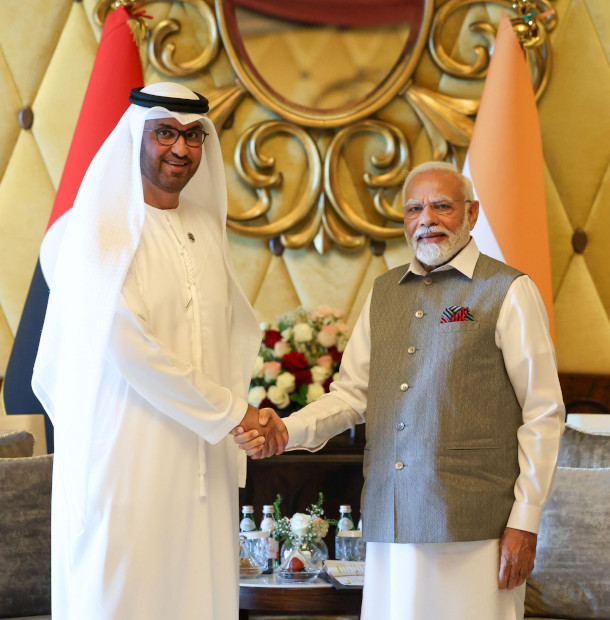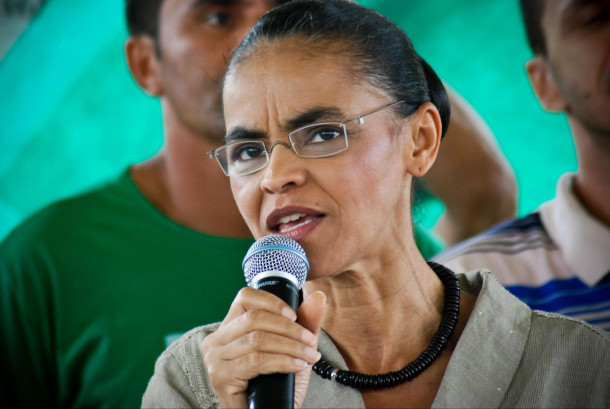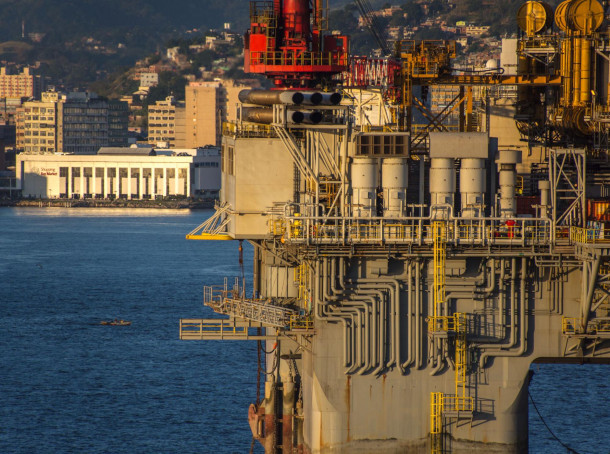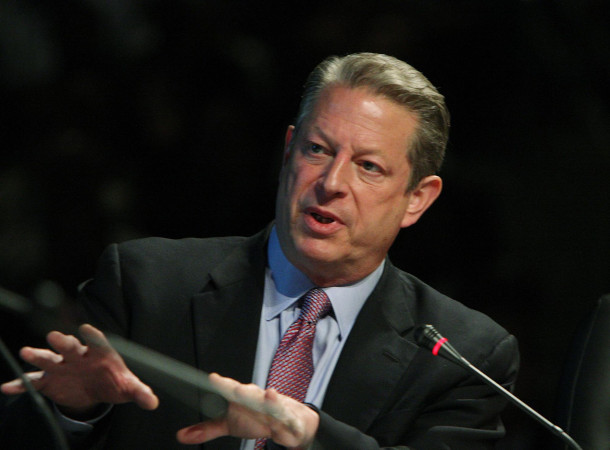Corporate Coopting of COP28?
Air Date: Week of December 1, 2023

Leaked documents allege that ahead of COP 28, COP President Sultan Al Jaber used bilateral meetings with leaders from around the world to promote his companies’ commercial interests. He is pictured here with India’s Prime Minister Shri Narendra Modi in July 2023. (Photo: MEAphotogallery, Flickr, CC BY-NC-ND 2.0)
Leaked documents from the team leading the COP28 climate talks now underway in Dubai point to corporate coopting of the UN climate negotiations. COP President Sultan Al Jaber is also CEO of the UAE national oil company Adnoc, which according to the internal documents has used the COP process to try to cut oil and gas deals with companies and countries. Ben Stockton of the Centre for Climate Reporting, which partnered with the BBC to verify and review these leaked documents, joins Host Steve Curwood to discuss.
Transcript
DOERING: From PRX and the Jennifer and Ted Stanley Studios at the University of Massachusetts, Boston this is Living on Earth. I’m Jenni Doering.
CURWOOD: And I’m Steve Curwood.
Leaked documents from the team leading the COP28 climate talks now underway in Dubai allegedly confirm the worst fears of critics of Sultan Al Jaber, the host country’s president for this UN Climate Summit. Al Jaber is also the UAE’s climate envoy, chair of the nation’s renewable energy company Masdar, and CEO of Abu Dhabi National Oil Company, or Adnoc. And according to the internal documents furnished by a whistleblower to the Centre for Climate Reporting and the BBC those UAE companies have used the COP process to advance their own interests. This included pushing for expansion of the UAE’s fossil fuel extraction business even as UN climate negotiators consider a phaseout of fossil fuels to keep crucial climate protection goals within reach. Ben Stockton is an investigative reporter for the UK-based Centre for Climate Reporting which partnered with the BBC to verify and review these leaked documents. Ben, welcome back to Living on Earth!
STOCKTON: Hi, Steve, thanks for having me back.
CURWOOD: So, what are these leaked documents revealed here? What are the allegations?
STOCKTON: Well, the allegations are quite simple, really, that Al Jaber, as COP 28 President, has used his role as head of this major UN Climate Summit and the meetings that he's been attending with foreign governments to essentially plan to lobby on behalf of the commercial interest of the two companies that he's involved with running, Adnoc and Masdar. And from the documents we've seen, they are essentially talking points that are included in briefings ahead of meetings with foreign officials. And basically, we've been able to get some insight on the way that this process works, which is Adnoc, the oil company, and Masdar are basically given advance warning that these bilateral meetings are going to happen and are given the opportunity to submit talking points, which are essentially things that the company would like Al Jaber to raise in these meetings. And, and it's often about oil and gas projects that are going on or that they would like to do with those countries.
CURWOOD: So these allegations are saying that there are commercial interests that are intertwined with the COP 28 presidency and process, if I hear you correctly.
STOCKTON: That's right. And the UNFCCC, which is the UN body which oversees the COP process, actually has rules in place intended to ensure the impartiality of the COP presidency. So the COP presidency is actually not supposed to represent any national interest, they're supposed to be impartial, let alone commercial interests, which is obviously the, the highly unusual situation that we've we've ended up in today.

Brazil’s climate minister, Marina Silva. Leaked briefings suggest that Al Jaber planned to further commercial discussions between Adnoc, the UAE oil company, and the Brazilian petrochemical company Braskem during a meeting with Minister Silva. (Photo: Talita Oliveira, Flickr, CC BY 2.0)
CURWOOD: Now, the UAE might say that well, Masdar, the renewable energy business that they have, well, maybe they're sort of squeezing the rules a bit. But isn't this what the planet needs?
STOCKTON: I think that is certainly an argument that they may make. But it all goes back to these UNFCCC rules, which are supposed to demand impartiality. And, you know, Masdar is not necessarily doing everything that perhaps experts would want it to do in terms of how it is approaching the climate crisis. And so I think there are real concerns here about commercial interests influencing the summit in a way that doesn't align with the UNFCCC's internal processes.
CURWOOD: So talk to me about some of the details of these talking points. What were Adnoc and Masdar hoping to accomplish in these bilateral meetings?
STOCKTON: Yeah, so the talking points typically includes the value of sales and trading that Adnoc does with those countries. And you know, this can be, you know, hundreds of millions of dollars, if not billions of dollars. And then they also occasionally get into more specific details. So for example, we saw a briefing for a meeting that Al Jaber was set to hold with Marina Silva, who is the Minister for Climate from Brazil. And it appears from that briefing that he planned to actually try and push for Adnoc's bid for a major Brazilian petrochemicals company called Braskem. There are also other examples of Adnoc explaining in the talking points of its strategic partnership with China, and raising the possibility of exploring more international gas projects. Similarly, the talking points in a briefing for a meeting with Egypt mentioned that Adnoc stands ready to support the supply of petrochemicals to the country. So there really is quite an extensive level of detail within these documents. And I think that's really what has shocked so many people.
CURWOOD: I believe you have what, 150, documents, emails, various things like that. Talk to me about one that just made your eyes pop.

Talking points for a briefing for a meeting with Egypt stated that Adnoc, the oil company Al Jaber heads, is ready to support the supply of petrochemicals to the country. (Photo: Yulia Sanchez, Flickr, CC BY-NC-ND 2.0)
STOCKTON: I think one particular document that really stood out was the briefing prepared ahead of the meeting with Marina Silva, the Brazilian climate minister. I think that because that really particularly related to ongoing commercial discussions that are being had between Adnoc and a Brazilian petrochemicals company called Braskem. And it was very clear in that briefing, that Al Jaber was planning to ask for the Brazilian government support in that deal, and actually appears to have planned to ask to have Silva facilitate a call with the appropriate minister to kind of continue the discussion about that. And so that really stood out as being a particularly egregious briefing out of the ones that, you know, the more than 150 pages that I've seen during the course of this reporting.
CURWOOD: And by the way, to what extent did this relate to the vast offshore resources that Brazil has that have so far not been exploited, but there's an enormous amount of oil down there?
STOCKTON: You know, the briefing didn't directly reference that. But as we saw across all of these briefings that mentioned Adnoc, the company really was looking to exploit the natural resources that are still available around the world. And I think one particular phrase that really stood out, that was actually included in a number of the briefings, was this phrase that really seems to epitomize Al Jaber's views on the climate crisis, which is that "there is no conflict between sustainable development of any country's natural resources, and its commitment to climate change." And that really seems to encapsulate this idea that if a country has natural resources, then it should be able to use those in order to develop its economy. And, you know, plenty of people would say that that is at odds with what we need to do to abate climate change.
CURWOOD: Now, these were talking point documents. To what extent do you have evidence that the meetings actually took place, and the outlines of these deals were offered?
STOCKTON: Sure, yeah. I mean, that was a very tricky part of the investigation. Some of these meetings, the COP 28 team has publicized on its Twitter feed. We were able to get some insight into what was raised in some of these meetings. So for example, we were able to confirm that on at least one occasion, a country followed up on the commercial interests that were raised during a meeting. I also spoke to someone who had knowledge of discussions in a meeting with another country who said that Adnoc interests were raised in that meeting as well. But beyond that, it you know, these are diplomatic meetings, it's very difficult for us as reporters to get insight on those. Of course, we asked the COP 28 team about these meetings and about these briefings. And they didn't deny that Al Jaber was using bilateral meetings to raise commercial interests. But they did tell us that, you know, private meetings are private and they won't comment on them.

Vast amounts of offshore oil remained untapped in Brazil. Several of Al Jaber’s leaked briefings stated, “there is no conflict between sustainable development of any country's natural resources and its commitment to climate change." (Photo: A. Davey, Flickr, CC BY-NC-ND 2.0)
CURWOOD: Now, as you've made your rounds as a reporter about this, what do advocates of dealing with climate disruption say about this situation?
STOCKTON: I think the reaction really has been one of kind of shock and astonishment. We have heard, former Vice President Al Gore, who has been quite vocally critical of Al Jaber's COP 28 presidency, and he described it as some of the worst fears of those who criticized his appointment really kind of coming to fruition and described it as utterly appalling. Christiana Figueres, who is the former executive secretary of the UNFCCC, she actually said that the COP team had been caught red handed. And that this will hopefully put so much public scrutiny on the way that that team operates that she hopes that they will step up to the challenge, not only that team, but also the entire world. You know, the UNFCCC has said that this is really a momentous COP and and a turning point. And many people have said that we really can't afford to have a "lost COP," and the hope is that, you know, revelations like this, and many of my other colleagues across the media have been doing, will really spur action at these talks.
CURWOOD: Science says that this is a critical moment in trying to have a more livable climate, and that we need to be reducing the production of fossil fuels and related emissions. Al Jaber says that his company is planning to expand production and your leaked documents would allege that he's doing this work with countries around the world. What do you think his position in this UN Climate Summit of advancing fossil fuels yet at a time when they need to be reduced, what do you think the impact is going to be?
STOCKTON: I think that's one of the kind of great questions hanging over this COP. We do know that Al Jaber has been a big advocate for a phase down rather than a phase out of fossil fuels. And that's actually something that's mentioned in the briefing documents that we saw. They actually prepared a kind of answers for a hypothetical Q&A that might happen around the UN General Assembly, when Al Jaber was in New York in September. And they actually go into a little bit more detail about why they advocate for a phase down rather than a phase out. And he says that it will allow for some fossil fuels to still be used with their emissions abated or offset. I think there are a number of experts who are concerned about whether we have the technological ability to be able to do that yet. And really, you know, Al Jaber's view on a phase down is at odds with the UN Secretary General who has called for a complete phase out and is saying that a phase out is increasingly urgent. And so it does seem that Al Jaber's views on this are at odds with at least some people. And what you say about Adnoc is absolutely right, that within the short term, they are ramping up production capacity, which really appears to be looking to capitalize on some of the energy security issues that have been presented by the war in Ukraine. And so we do see the actions of Al Jaber's as oil company, at least in the short term, certainly being at odds with what experts are telling us must happen.
CURWOOD: There's a range of response to Al Jaber, from outrage to cautious optimism that somehow this will work to have a successful COP. How successful do you think that this Conference of the Parties can be with Al Jaber at the helm?

Former Vice President Al Gore said the leaked documents confirmed the worst fears of those concerned about Al Jaber’s COP 28 presidency. (Photo: Center for American Progress, Flickr, CC BY-ND 2.0)
STOCKTON: I think it's yet to be seen, really. Lots of people, in particular Kerry, are supportive of his COP presidency, and a number of people see him as someone who can bridge the gap between the fossil fuel industry and climate advocates. He is certainly someone who has a foot in both camps. And many people believe that the fossil fuel industry should be at the table and part of these talks. I think there is a difference between being at the table and being at the head of the table, which is where Al Jaber currently finds himself. And you know, quite rightly, there are a number of people who are very concerned about how successful this COP can be under an individual who has so many vested interests in the success of the fossil fuel industry.
CURWOOD: Ben Stockton is an investigative reporter for The Centre for Climate Reporting. Thanks, Ben.
STOCKTON: Thanks so much, Steve.
CURWOOD: At a press conference on the eve of COP28, Sultan Al Jaber flatly denied the claims.
AL JABER: These allegations are false. Not true, incorrect, and not accurate. And it's an attempt to undermine the work of the COP 28 presidency.
CURWOOD: But Al Jaber went on to confirm he has been in discussions with countries and companies and feels he’s gotten mixed signals about the ethics of that.
AL JABER: Every meeting I have conducted with every government, or any other stakeholder has always been centered around one thing, and one thing only. And that is my COP 28 agenda, and how we can collectively, for the first time ever adopt a mindset that is centered around implementation and action to keep 1.5 within reach. Now, sometimes, I am told you need to engage with governments and with oil and gas companies, to put pressure and sometimes I'm told you can't do that. So we're damned if we do. We're damned if we don't.
CURWOOD: COP28 president Sultan Al Jaber.
Links
Living on Earth wants to hear from you!
Living on Earth
62 Calef Highway, Suite 212
Lee, NH 03861
Telephone: 617-287-4121
E-mail: comments@loe.org
Newsletter [Click here]
Donate to Living on Earth!
Living on Earth is an independent media program and relies entirely on contributions from listeners and institutions supporting public service. Please donate now to preserve an independent environmental voice.
NewsletterLiving on Earth offers a weekly delivery of the show's rundown to your mailbox. Sign up for our newsletter today!
 Sailors For The Sea: Be the change you want to sea.
Sailors For The Sea: Be the change you want to sea.
 The Grantham Foundation for the Protection of the Environment: Committed to protecting and improving the health of the global environment.
The Grantham Foundation for the Protection of the Environment: Committed to protecting and improving the health of the global environment.
 Contribute to Living on Earth and receive, as our gift to you, an archival print of one of Mark Seth Lender's extraordinary wildlife photographs. Follow the link to see Mark's current collection of photographs.
Contribute to Living on Earth and receive, as our gift to you, an archival print of one of Mark Seth Lender's extraordinary wildlife photographs. Follow the link to see Mark's current collection of photographs.
 Buy a signed copy of Mark Seth Lender's book Smeagull the Seagull & support Living on Earth
Buy a signed copy of Mark Seth Lender's book Smeagull the Seagull & support Living on Earth

